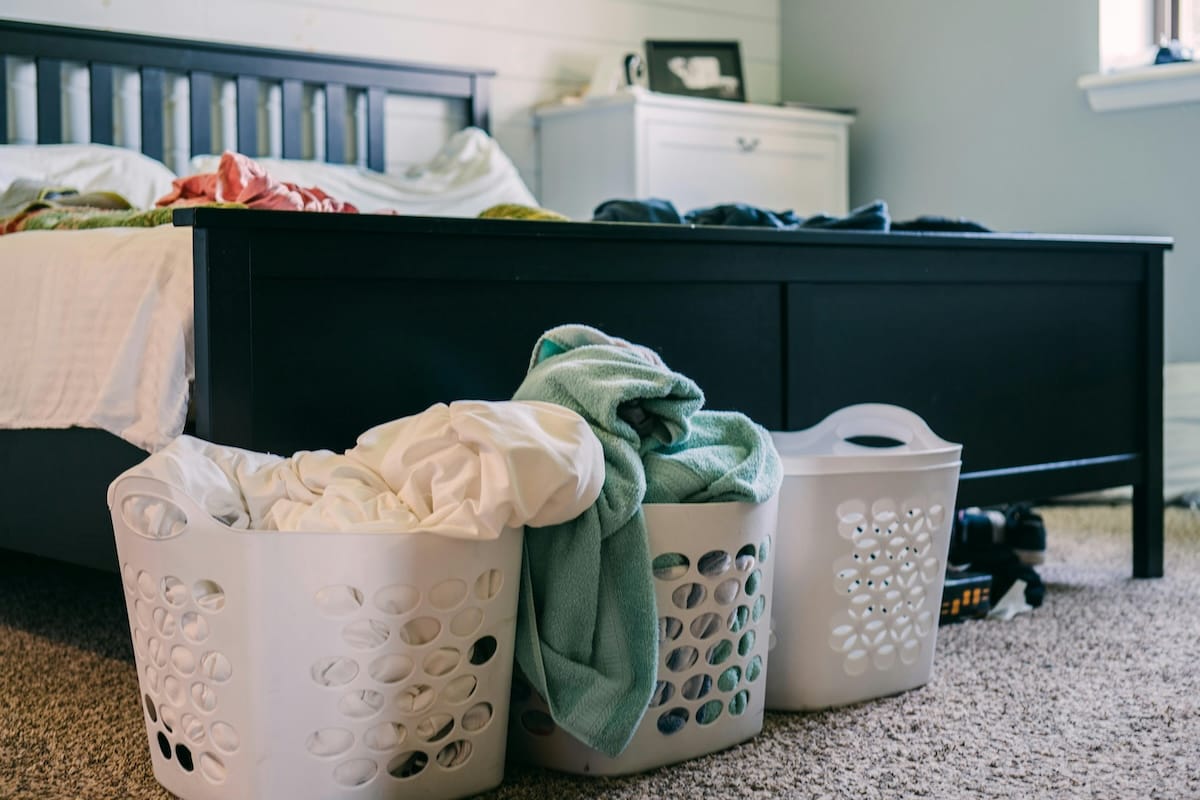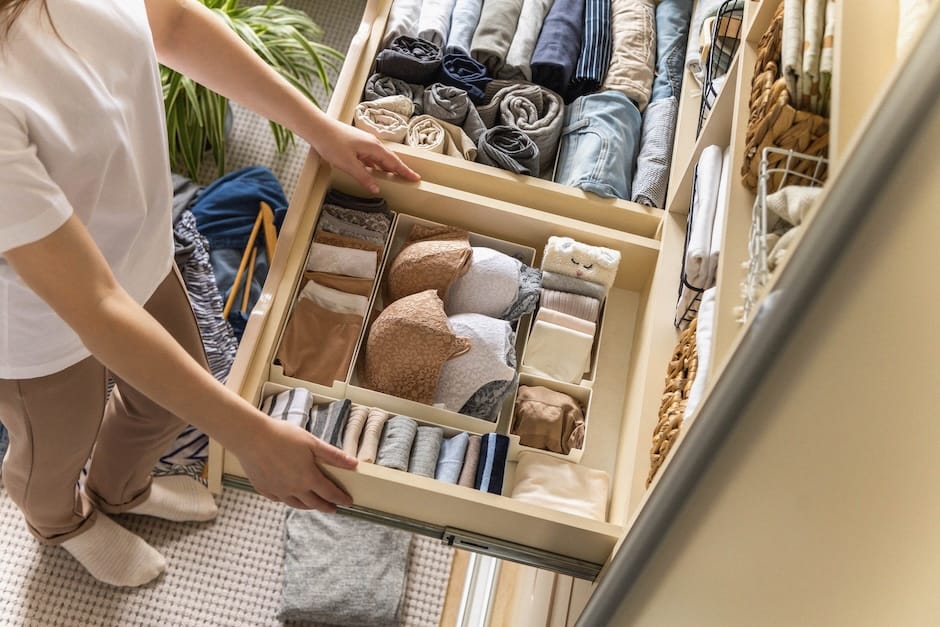We take a deep dive to clear things up
What’s the first thing you do when you’re feeling stressed? Me? I take out the bins. It’s an unusual self-care hack, but somehow it makes me feel lighter and more in control.
Next, I’ll tackle ‘the messy drawer’ – a space in our home that houses all the random stuff we’ve accumulated that doesn’t have a space of its own, like business cards, charging leads, and half-used chapsticks that should have been tossed long ago.
These tasks, as simple and unassuming as they seem, give me a feeling of accomplishment and control. By simply creating some physical space in my home, I feel a little more ready to take on the world. Maybe you’ve noticed that by saying goodbye to the stuff you no longer need, you feel a little more empowered, too.
If so, you’re certainly not the only one to recognise the power of a little tidying up. Just ask Marie Kondo, decluttering expert and author of the New York Times bestseller The Life-Changing Magic Of Tidying Up, or simply turn on your TV where you’ll find countless shows extolling the benefits of decluttering, like Master The Mess and The Gentle Art Of Swedish Death Cleaning.
These books and shows all have one thing in common: they each claim that decluttering has the ability to make you happier. But when it comes to mental health, is tidying up as transformative as the hype would have you believe? Or, is it simply a mental health Band-Aid, that offers a too-simple solution for something as complex as achieving long-term, good mental health?
Tap to tidy
Solutions-focused psychotherapist Gin Lalli weighs in. She says, “When we’re anxious or stressed, we can feel like we have lost control, so decluttering is an active process to get that sense of control back again.
“Clutter can be distracting. It makes it difficult to concentrate on your tasks, so by creating a more organised environment, you’re promoting focus and productivity as well,” she enthuses.
In our always-on world, full of lengthy to-do lists and impending deadlines, it’s all too easy to feel overwhelmed and uncertain. And when we feel this way, clutter can seem especially suffocating. In turn, this limits your ability to think clearly, and impacts your capacity to make decisions, whether you’re making a life-altering choice about your future, or simply deciding what to have for tea.
Gin says, when it comes to decluttering, increased mental clarity is the benefit that her clients report most. In her opinion, clutter is never a purely physical thing. It’s often a manifestation of what is going on inside our heads; a reflection of our mental state.
Think of it like this: have you ever felt too overwhelmed to tackle your overflowing laundry basket after a stressful day of work, or noticed that clutter seems to pile up when your mind is on other things? When our thoughts feel busy and disorganised, sometimes our homes do as well.

Occasionally, clutter – and indeed the need to get rid of it – can be a warning sign of an undiagnosed mental health concern, like a hoarding disorder or obsessive compulsive disorder (OCD). Take one study, published in the Personality and Social Psychology Bulletin, for example, which found that people who described their homes as ‘cluttered’ were more likely to feel stressed and depressed.
If you feel overwhelmed by stuff or by your need to get rid of it, Gin advises checking if your behaviours are excessive, or compulsive, or if they interfere with your daily functioning.
“When cleaning or decluttering becomes your primary focus, to the detriment of other important factors in life, then you should really seek professional help,” she notes. “It’s not a healthy coping strategy, and decluttering alone is not enough to address certain mental health conditions like depression, anxiety, or OCD.”
Does decluttering offer many mental and emotional benefits? Sure, but it’s not a fix-it-all for mental health, and if you’re dealing with extreme stress, or managing a diagnosable mental health concern, it’s likely to fall short of the mark.
“Decluttering can clear mental fog and provide a sense of mental clarity,” Gin points out, but if you’re using it as a mental health aid it can only go so far. Basically? You won’t find the answer to your problems or the root cause of your issues at the bottom of a recently decluttered drawer.
“While decluttering can provide temporary relief, and even a sense of accomplishment, it is important to seek comprehensive mental health support and/or treatment if it’s required,” Gin says. That might mean sharing how you’re feeling with a friend, or seeking out the support of a qualified therapist.
Time to tidy up
If you are planning to declutter as a way of bringing some balance back into your life, then take the advice of Lisa Talbot, a personal stylist who helps people declutter their wardrobes. She says her clients often describe decluttering as a cathartic experience. Some tell her it’s lifted a weight off their shoulders, while others say it’s acted as an antidote to overwhelm.
Her top decluttering tip is to make sure the timing is right: you shouldn’t do it if, mentally and emotionally, you don’t feel ready. And when you are ready to take tidying on, it’s a good idea to start small. Begin with one room at a time, or even just a wardrobe, cupboard, or drawer. Whatever feels manageable for you in the moment.

Lisa advises grouping similar items together, so you can see exactly what you have. “Then go back through the sections and ask yourself, ‘Do I love it?’ If the answer is no, then you can remove the item,” she suggests. And if the whole process feels too emotionally taxing? Stop and come back to it another time.
Ultimately, Gin says, the environment you are in plays a huge part in your mental fitness. “Think about how good you feel when you are in nature, or have beautiful things around you,” she says. “We should be treating our personal spaces in this way too; creating a safe, beautiful place for ourselves where we can be truly relaxed.”
Whether you’re a seasoned declutterer who simply loves getting rid, or a procrastinator who avoids it at all costs, it’s a good idea to manage your expectations. Decluttering can transform your home, but don’t expect it to transform your mind. Mental health is complex, and decluttering simply won’t solve all your problems.
That said, if you’re going through a rough patch, struggling to make a big decision, or wanting to start over, letting go of some of your physical baggage might just help you muddle through.


Comments